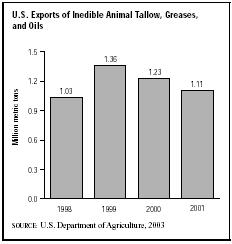SIC 2077
ANIMAL AND MARINE FATS AND OILS
This category covers establishments primarily engaged in manufacturing animal oils (including fish oil and other marine animal oils) and fish and animal meal, together with those rendering inedible stearin, grease, and tallow from animal fat, bones, and meat scraps. Establishments primarily engaged in manufacturing lard and edible tallow and stearin are classified in meat-producing industries; those that refine marine animal oils for medicinal purposes are classified in SIC 2833: Medicinal Chemicals and Botanical Products; and those manufacturing fatty acids are classified in SIC 2899: Chemicals and Chemical Preparations, Not Elsewhere Classified.
NAICS Code(s)
311613 (Rendering and Meat By-Product Processing)
311711 (Seafood Canning)

311712 (Fresh and Frozen Seafood Processing)
311225 (Fats and Oils Refining and Blending)
The majority of the industry in the early 2000s was engaged in the manufacture of feed and fertilizer byproducts. Grease and inedible tallow accounted for 60 percent of industry production in 2002, and other animal and marine oil mill products made up the remaining share. Total shipments for this industry in 2002 reached 104 million metric tons.
Though the output quantities for meat meal and tankage were much larger than those for fish meal and oil in this industry in the early 2000s, and though fish meal typically constituted a small portion of the feeds given to poultry, pigs, and cattle (among such other ingredients as feather meal, meat meal, bone meal, and soybean meal), fish meal could make up more than 50 percent of the content of feeds manufactured for pond-raised salmon and trout.
In addition, fish meal represented a uniquely valuable source of nutrition because of its especially rich crude protein content and prominence of essential amino acids and because its consumption was linked to faster growth and reproduction in livestock and larger quantities of eggs and milk. Moreover, fish oil—a natural byproduct of fish meal manufacturing, released when steam-cooked fish are passed through large screw presses—had significant value in the domestic food industry. In 2001, more than 1.7 billion pounds of U.S. fish were reduced to either fish meal or fish oil.
There were several companies of significant size engaged in this industry in the early 2000s. Darling International Inc., based in Irving, Texas, had 2003 sales of $324 million and employed around 1,200 workers. Other leading members of the industry included Des Moines, Iowa-based National By-Products Inc., which posted sales of $176 million in 2002, and American Proteins Inc., based in Roswell, Georgia.
The outlook for employment in the industry was bleak in the late 1990s. Jobs for production workers were expected to decline steadily through the early 2000s.
U.S. exports of inedible tallow, greases, and oils grew from 1.03 million metric tons in 1998 to 1.11 million metric tons in 2001. Mexico was the leading market for exports of U.S. animal tallow, greases, and oil, both edible and inedible, in the early 2000s.
Further Reading
U.S. Department of Agriculture, National Agricultural Statistics Service. "Miscellaneous Agricultural Statistics." Washington, DC: 2003. Available from http://www.usda.gov/nass/pubs/agr03/03_ch3.pdf .
——. "Statistics of Oilseeds, Fats, and Oils." Washington, DC: 2003. Available from http://www.usda.gov/nass/pubs/agr03/03_ch3.pdf .
Comment about this article, ask questions, or add new information about this topic: